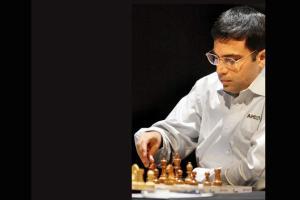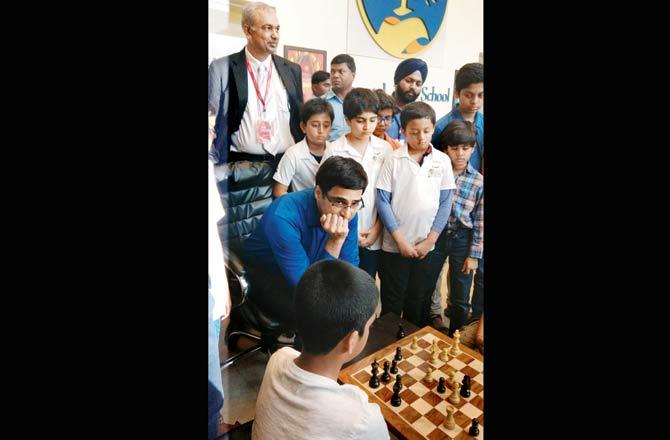In a new book, Viswanathan Anand offers golden words of advice on how young players should make their moves in the competitive world of chess

Viswanathan Anand
The common misconception among most budding chess players in the '80s was that a phenomenal talent like Viswanathan Anand, whom everyone was rooting to be India's first GM and later, World Champion, need not work hard like other regular chess players. The current crop of youngsters may be thinking on similar lines and it is just these milestones and roadblocks in a champion's journey that are effectively explained in Anand's new book, Mind Master.
ADVERTISEMENT
"I hate to undermine the worth of talent. Unquestionably, talent exists. It's no myth or hokum. However, talent isn't everything. Knowledge and growth don't come easily. You have to be willing to put in the hours and the effort, sometimes even without visible progress, because one day, unexpectedly, the results will flower," Anand says in his book.
The Classical title at Bonn in 2008 against Vladimir Kramnik firmly shut up critics who had dismissed Anand's previous titles as not worthy to be listed amongst the Classical Champion legends. Here, the surprise and risk factor in changing his opening from the King's pawn to the Queen's' pawn, the methodical study before unleashing this unanticipated weapon, pushed Kramnik on the back foot right from the word go. Anand beautifully summed it up: "The King's pawn opening was closely entwined with my insignia as a player.

Viswanathan Anand watches a game of chess played by kids at an event in Mumbai in 2017
It's also the square I autographed when fans at tournaments laid out their chessboards before me. It's where my opponents would hope to find me. I had no doubt that Kramnik too was likely to anticipate the same. Almost like an epiphany, it struck me that I could in fact play Kramnik's own pet Opening the 1.d4 against him."
In an interaction with Sunday mid-day, the chess legend shared some tips for budding chess players.
Edited excerpts from the interview.
Tell us about the importance of writing down notes and impressions after a game.
It is very important after a game to immediately write down your impressions and analyse things as you tend to forget a lot of details, most importantly your thought process during the game. There are times when you make mistakes while evaluating a position—you go down false alleys and return back with time loss or instances when you are unsure of how to proceed. It's worst when you had thought of promising continuations but discarded or dismissed them off-hand at the game. The memory is generally stronger in that one hour after the game and you may be able to scrutinise these aspects more objectively. More the delay, lesser the recall. Initially, I started this habit more to please my mother but later jotted down my opponents' reactions, their quirks, irritating habits, etc, that would distract me. I often keep revisiting my notes which may look like a manual of sorts. It is a habit that I maintain till date.
How should youngsters analyse their games?
I used to analyse with my opponent immediately after the game. Generally, when you analyse with your opponent, the glimpses into his thought process can be eye-openers. Of course, these days, chess engines don't miss out on anything.
Tell us about the study time needed for pattern recognition and reinforcing ideas.
It is critical to set up topics that you should learn but it's difficult to decide the repetition times as that varies from player to player. The best thing to do is to keep learning and practising the same kind of position regularly till it stays imprinted in memory.
How should parents of young players select a coach?
For me, the most important criteria for a coach is that he should be affectionate because comfort and compatibility are essential to inculcate learning. Obviously, the regular criteria as to his playing ability and references go without saying but beyond that, evaluation depends on the stage the child is in. When I started playing at the World level, my first few coaches were more like friends, who were added for help but then Elizbar Ubilava and Peter Heine Nielsen [Anand's former coaches] brought in more professionalism.
Being a lightening kid yourself, what would be your advice to youngsters who have a tendency to play fast?
I would advise them to basically to go with the flow. You need to evaluate and re-evaluate what works best for you. If you think that you are blundering a lot of positions, then you have to consciously slow down. I cannot provide a blanket recommendation since children have different playing styles and strengths.
How should parents nurture a chess talent?
Parents should be supportive. It is difficult initially to judge how talented or how good a child is. If the child wants to do something else after some time, it is best to leave the board. Some decisions in life, like priority related to academics, will come later on but basically, you have to check whether the child is enjoying his chess.
Methodical training or self study, what's your advice?
This decision comes at a point for players who are seriously into chess and intend turning professional. Initially, it is difficult to spend more time but whatever amount of time you are comfortable with should be enough. Some minimum time is required but if you are not able to compete and face a backlash at the board then it's best to leave. You don't have to force yourself.
What are your suggestions to youngsters on setting goals and chasing titles?
It's nice to say that one should not chase goals but everybody does. It is helpful to have goals since they allow you to focus on something. Try not to be too obsessive about them though. Remember, children can excel at unexpected moments but when things don't work out, don't press the panic button. I won my first World title in 2001, lost it the next year and regained it in 2007.
Should young chess players pursue other hobbies?
It is healthy for children to have a lot of interests. It is not a recommendation that kids should be physically fit to play good chess but I recommend physical fitness in general and of course, it helps in their chess. Children should have a broader outlook and be interested in many subjects. That's true of every sphere of life.
Do talent and hard work go hand in hand?
You cannot reach any destination without hard work. In fact, you won't recognise the existence of talent unless you pursue your hobby diligently. Your talent enhances or grows when it is coupled with hard work and it is something that bonds with the right parents and coach. Without curiosity and inquisitiveness, you lose the ability to be opportunistic or expand your knowledge base. Whether talent makes hard work irrelevant or hard work makes talent irrelevant is an unfair argument. Talent and hard work aren't conflicting forces orbiting in separate galaxies. They are complementary and provide each other with sustenance.
What is your advice to those who don't progress or run into walls despite working hard?
If you run into walls, try to go around them. If you have problems in a particular area, first try to work on that, change your style, bypass the obstacle by either experimenting or improvising. Learn something new.
Mind Master: Winning Lessons from a Champion's Life by Viswanathan Anand (as told to Susan Ninan) published by Hachette India, will be available in bookstores and online from December 11
Catch up on all the latest sports news and updates here. Also download the new mid-day Android and iOS apps to get latest updates
 Subscribe today by clicking the link and stay updated with the latest news!" Click here!
Subscribe today by clicking the link and stay updated with the latest news!" Click here!






